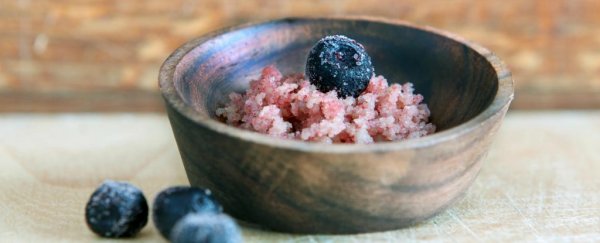Researchers in Finland have invented an appliance that grows food ingredients - basically, all the healthy compounds found within veggies - using plant cells inside a bioreactor.
The team says the system, known as the CellPod, works by growing plant cell material from a seed culture, producing proteins, fibres, and other plant-based compounds, to give the user the benefits of a greenhouse on their kitchen counter - no farm required.
"Urbanisation and the environmental burden caused by agriculture are creating the need to develop new ways of producing food - CellPod is one of them. It may soon offer consumers a new and exciting way of producing local food in their own homes," said research scientist Lauri Reuter, from the Technical Research Centre of Finland (VTT).
Instead of growing entire plants, like traditional gardening and farming does, the VTT team says the CellPod works by growing undifferentiated plant cells, creating enough plant matter to be harvested about once a week.

In other words, the CellPod allows people to grow the 'good stuff' inside plants - the healthy compounds - without the need for cultivating an entire tree, shrub, or seedling.
"These cells contain the plant's entire genetic potential, so they are capable of producing the same healthy compounds - such as antioxidants and vitamins - as the whole plant," the team said. "The nutritional value of a cloudberry cell culture, for example, is similar to or even better than that of the berry itself."
While the team says they have so far been able to grow Arctic bramble cells, cloudberry cells, and stone bramble cells, they note that the taste is lacking. Instead of getting that juicy, delicious berry taste when eating foods created in the CellPod, a person would get a very mild, muted taste.
"The taste still needs development: at the moment, it is very mild and neutral," the team said.
This also means that the foods created in the CellPod look more like oatmeal or breakfast cereal than, say, a berry picked from nature.
 VTT
VTT
Rather than supplying an entire meal, the CellPod aims to be a good way to nutritionally boost meals by adding some of the cell-grown plant materials to already prepared meals tasting foods - almost like a supplement.
"The development of tailored cell lines is also possible, in which case nutritional characteristics can be developed according to need," the team said.
It's important to note that their work has yet to be peer-reviewed, meaning it's impossible to verify just how well the machine is working at this time, and how nutritious their ingredients really are.
But the VTT researchers aren't the only ones trying to bring the nutritional benefits of having a home garden directly to the kitchen counter.
Earlier this month, a Kickstarter campaign successfully funded a product called the Nanofarm, which allows people to grow organic produce in their kitchens from seeds inside a climate controlled container.
It's unclear what the future of agriculture will look like, but with different companies and research teams coming out with new ideas every day, the traditional approach might be on its way out.
